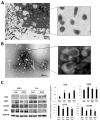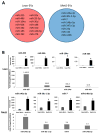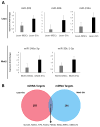The metabolic syndrome alters the miRNA signature of porcine adipose tissue-derived mesenchymal stem cells
- PMID: 28678424
- PMCID: PMC5756133
- DOI: 10.1002/cyto.a.23165
The metabolic syndrome alters the miRNA signature of porcine adipose tissue-derived mesenchymal stem cells
Abstract
Autologous transplantation of mesenchymal stem cells (MSCs) is a viable option for the treatment of several diseases. Evidence indicates that MSCs release extracellular vesicles (EVs) and that EVs shuttle miRNAs to damaged parenchymal cells to activate an endogenous repair program. We hypothesize that comorbidities may interfere with the packaging of cargo in MSC-derived EVs. Therefore, we examined whether metabolic syndrome (MetS) modulates the miRNA content packed within MSC-derived EVs. MSCs were collected from swine abdominal adipose tissue after 16 weeks of lean or obese diet (n = 7 each). Next-generation RNA sequencing of miRNAs (miRNA-seq) was performed to identify miRNAs enriched in MSC-derived EVs and their predicted target genes. Functional pathway analysis of the top 50 target genes of the top 4 miRNAs enriched in each group was performed using gene ontology analysis. Lean- and MetS-EVs were enriched in, respectively, 14 and 8 distinct miRNAs. Target genes of miRNAs enriched in MetS-EVs were implicated in the development of MetS and its complications, including diabetes-related pathways, validated transcriptional targets of AP1 family members Fra1 and Fra2, Class A/1 (Rhodopsin-like receptors), and Peptide ligand-binding receptors. In contrast, miRNAs enriched in Lean EVs target primarily EphrinA-EPHA and the Rho family of GTPases. MetS alters the miRNA content of EVs derived from porcine adipose tissue MSCs. These alterations could impair the efficacy and limit the therapeutic use of autologous MSCs in subjects with MetS. Our findings may assist in developing adequate regenerative strategies to preserve the reparative potency of MSCs in individuals with MetS. © 2017 International Society for Advancement of Cytometry.
Keywords: extracellular vesicles; mesenchymal stem cells; metabolic syndrome; microRNA.
© 2017 International Society for Advancement of Cytometry.
Conflict of interest statement
The authors declare no conflict of interest.
Figures





Comment in
-
Obesity reshapes stem cell extracellular vesicles.Cytometry A. 2018 Feb;93(2):177-179. doi: 10.1002/cyto.a.23166. Epub 2017 Jul 12. Cytometry A. 2018. PMID: 28700124 No abstract available.
References
-
- Dominici M, Le Blanc K, Mueller I, Slaper-Cortenbach I, Marini F, Krause D, Deans R, Keating A, Prockop D, Horwitz E. Minimal criteria for defining multipotent mesenchymal stromal cells. The International Society for Cellular Therapy position statement. Cytotherapy. 2006;8(4):315–7. - PubMed
-
- Lai RC, Chen TS, Lim SK. Mesenchymal stem cell exosome: a novel stem cell-based therapy for cardiovascular disease. Regen Med. 2011;6(4):481–92. - PubMed
-
- Yeo RW, Lai RC, Zhang B, Tan SS, Yin Y, Teh BJ, Lim SK. Mesenchymal stem cell: an efficient mass producer of exosomes for drug delivery. Adv Drug Deliv Rev. 2013;65(3):336–41. - PubMed
-
- Eirin A, Zhu XY, Puranik AS, Woollard JR, Tang H, Dasari S, Lerman A, van Wijnen AJ, Lerman LO. Integrated transcriptomic and proteomic analysis of the molecular cargo of extracellular vesicles derived from porcine adipose tissue-derived mesenchymal stem cells. PLoS One. 2017;12(3):e0174303. - PMC - PubMed
MeSH terms
Substances
Grants and funding
LinkOut - more resources
Full Text Sources
Other Literature Sources
Medical

